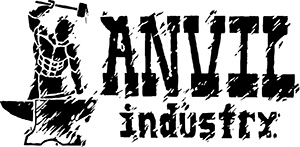Working with Resin
Resin is the best material for high quality miniatures as it allows far more detail than plastic or metal. If you are unfamiliar with resin miniatures, we recommend you take some time to read this guide.
Most Important
- Our products do not usually need to be washed before use if you are using a good quality spray primer, but it is good practice just in case.
- Please be extremely careful when working with knives, saws, files, Pin Vices etc
- Take extra care if you are unused to the material, as its physical properties are a little different from plastic/metal.
- Breathing in small particles is potentially hazardous. If you need to sand or file Anvil Industry products, please work in a well ventilated area and wear a dust mask.
- Test fit first before assembly, and always use good quality super glue.
Material properties
Our high-quality resin is durable, slightly flexible, and easy to work with using most hobby tools. It is not as strong as injection moulded plastic/metal so consider how you will store your miniatures.
If you’ve not worked with resin before, we recommend you practice using various tools on a piece of sprue or unimportant/invisible bit of a part. Experiment with cutting into it, it's always best to shave off small amounts, don’t try and cut massive chunks.
Resin will soften in heat. This is great because it allows you to bend and shape flexible components, but you do need to be careful to store your miniatures at approx room temperature. Do not leave them somewhere hot e.g a car boot on a sunny day.
Clean up and preparation
Our products are cast in a near-perfect vacuum and then cured under pressure, This means the components produced are 99% bubble free and of the highest quality, however, you will need to carefully remove the "gate" where the resin flows into the part.
The Split moulds used will sometimes leave a faint line on the component, which can be carefully scraped off using the edge of a sharp hobby knife. Flashing is a thin film of resin which has leaked, it can usually be brushed off with your fingers or a toothbrush where it is still attached to the part.
We do not use mould release sprays (the most common cause of shiny, unpaintable resin parts) but the production process occasionally leaves a film of silicone oil on the parts. If you parts look at all shiny, we recommend you wash them to ensure best paint adhesion, you can wash you components in soapy water (warm, not hot!) and scrub them thoroughly with a toothbrush or similar.
Assembly
We recommend you “test fit” assemble your miniatures with Blu-tack (or similar adhesive putty), as this allows you to decide on poses and check all parts fit well with each other prior to gluing anything. Certain combinations of parts may require some trimming or alteration to work well, and test fitting allows you to do this work before assembly.
You can use very hot water to soften the parts, allowing to you bend them slightly (for example, straightening swords). The process is the same as brewing a cup of tea. Pour boiling water over the parts in a mug/cup. After 5 minutes, fish them out with a tea spoon and you have a few seconds to reshape them slightly. Hold the part in the required shape and dunk it in cold water to set. You can repeat this process several times if desired.
Once you’ve test fitted everything, glue the resin parts with super glue. We recommend using a “2-5” second setting glue as this gives you a little time to ensure a perfect alignment.
To get the best results, we strongly recommend using Loc-Tite or a similar quality super glue brand.
Painting
As we do not use large quantities of mould release spray (which can cause trouble with other kits) our Miniatures and parts will usually take primer spray and paints with no problem at all. A good quality matt primer spray is recommend. As you are investing in premium quality resin models, get a premium quality spray paint to get a good coverage with out obscuring the detail.
Games Workshop sprays are excellent and are what we use in house. Halfords automotive grey primer is also good. We have been advised by some customers that Rust-Oleum Primer spray may not work well with our products.
You can also hand undercoat with a brush or use an airbrush with very good results. Vallejo's "model air" range adheres excellently to resin. Hand undercoating takes longer but can sometimes get better results.
If you have any further questions about any part of the process we will be happy to help you get the most out of your purchase.
You can email us at support@anvilindustry.co.uk




























